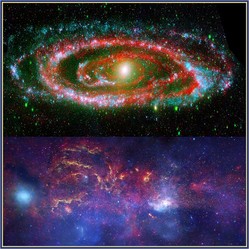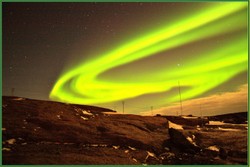Our universe might be truly, extremely large - but finite from the standards and units of Cosmos. Or it might be infinitely large and cannot be measured, extending infinitely in all directions. Either of these explanations however do not in any way make it easier to understand the properties of universe.
Imagining a single universe is complicated enough and to explain it using the law of physics increases the degree of difficulty. Moreover, the fact of existences of more than universe may baffle us completely. But breaking the Cosmos in parallel universes makes it possible for scientists to understand many perplexities.
Images from Pixabay
Author skeeze
© copyright WriterArtist 2015, All rights reserved




















 Harvest Bounty of Fall Fruitson 08/03/2023
Harvest Bounty of Fall Fruitson 08/03/2023
 Is Buddhism older than Hinduism?on 06/13/2023
Is Buddhism older than Hinduism?on 06/13/2023
 Was Tirumala Tirupati Balaji Temple a Buddhist Shrine?on 06/13/2023
Was Tirumala Tirupati Balaji Temple a Buddhist Shrine?on 06/13/2023
 The Great Wave of Kanagawa from Japanese Artist Hokusaion 06/11/2023
The Great Wave of Kanagawa from Japanese Artist Hokusaion 06/11/2023



How big is our universe?
WriterArtist, Thank you for the practical information and product lines.
Is it possible that the series about parallel universes was Fringe? That's what comes up as the most likely candidate from an internet search.
Alex Kurtzman of the ongoing Hawaii Five-0 series and of Fringe is involved with the Star Trek Discovery series that brings in parallel universes.
Well, one theory is that the universe is infinite, or at least expanding infinitely. Otherwise there would have to be an edge, kind of like when people thought the world was flat and they'd fall off if they sailed too far! I don't know if there are multiple universes, but I agree that exploring it in the imagination, or fiction (like the TV show "Fringe") is fascinating.
I think Einstein would explain it with our imagination - it is as big as we can imagine...
@frankbeswick - Scientists feel that the space is filled with dark matter which is not the usual stuff our earth and solar system is made of. We use the term "Baryons" for ordinary matter (the stuff physicists understand and can explain by the law of physics) which includes protons and neutrons.
This "Dark matter" is a hypothetical matter that cannot be detected and viewed by telescopes. Also, it neither emits or absorbs any electromagnetic radiation like light, magnetic energy etc. It is a real challenge for the physicists to explain "Dark matter" which they think is distributed around our galaxy.
If you ask me, I feel the space is empty, but then, I am not a scientist, I don't have the urge to explain the presence of energy and the need to invent some new subatomic particles to fill in the vacuum. Scientists have wondered what fills our galaxies, and then the space between galaxies making the universe, and then there is the space between 2 or more universes which make the Cosmos. Then comes the million dollar question what is that lies outside the Cosmos.
A philosophical question: physicists talk of dark matter, which makes up ninety per cent of the universe. It's a reality, but how do we know that it is matter? Is there not a philosophical assumption behind this statement?
@Mira - More likely it is the work of fiction, nothing scientific in it. There is a TV serial which shows 2 parallel universes existing and the crossing of people from these two universes into the wrong one, the depiction is quite fascinating and the events, full of surprises. I do not remember the name of the serial but I used to watch it without fail.
@frankbeswick - I too find it extremely difficult to think that there is another carbon copy of mine existing in the parallel universe. However; there are people who have tried giving explanation for such existence.
It's certainly fascinating to listen to Michio Kaku talk about the universe, and the video you provide at the bottom of your article is no exception. I find fiction based on this "sheer speculation" enchanting, so even if we can't know anything, at least we have a lot of fun exploring these things in our imagination.
At the moment we cannot know whether there is a parallel universe, all we can do is theorize. There may be clues that there is such a reality, but cosmology is so strange, to the point that human understanding comes to its limits, so the best position to take is to be open minded.